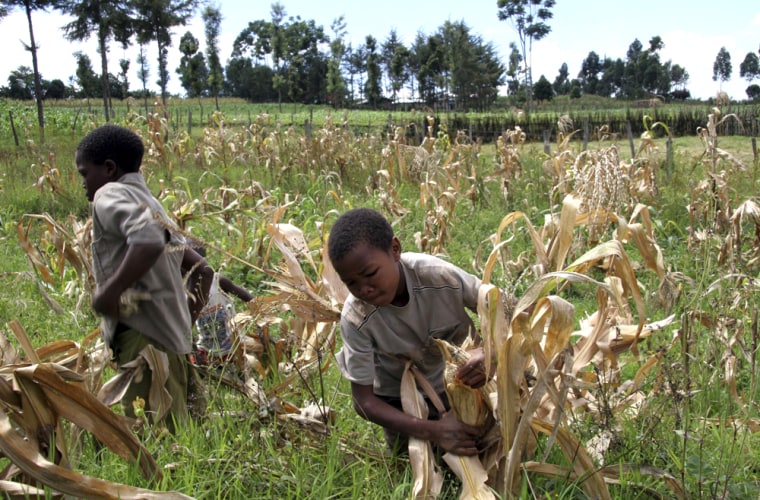Kenya's president declared the country's food crisis a national disaster Friday and asked international donors to contribute $406 million toward emergency food.
However, Germany's ambassador urged the Kenyan government to tackle corruption in its agricultural sector, saying "somebody out there is taking advantage of the famine to enrich themselves."
Nearly a third of Kenya's 34 million people face food shortages because of crop failures after drought last year.
Tens of thousands of farmers also were unable to plant crops last year when they were displaced from their land during postelection violence that saw more than 1,000 people killed, President Mwai Kibaki said.
The government has set aside 5 billion shillings ($63.4 million), but the country needs a total of 37 billion shillings ($469.5 million) for its emergency needs until August, Kibaki told diplomats and senior government officials.
The government will also sell fertilizer at affordable prices and cut the price of seed by 10 percent so that farmers can easily plant crops in the coming season, which begins in March, the president said.
But German ambassador Walter Lindner, echoing the concerns of other diplomats who spoke before the president made his appeal, said Kenya should pursue reports of corruption.
There have been allegations in local media that some farmers or companies have known ahead of time about changes in government policy and therefore have been able to profit.
'Rogues'
Diamond Lalji of the Cereal Millers Association said that, for example, some people sold large quantities of maize in neighboring countries just ahead of a November ban on maize and maize product exports.
Kibaki acknowledged that there were "a few rogues," and the government had caught some of them and they will be in court soon.
"My government will not tolerate the actions of some officials and unscrupulous traders who seek to manipulate the food supply chain for their own benefit," Kibaki said.
"Therefore, let it be clear to all that under no circumstance will my government allow the livelihood of our people to be sacrificed at the altar of the private gain of a few people," the president said.
Kenya is still recovering from the postelection violence that erupted after the Dec. 27, 2007 presidential vote. The crisis ended with a coalition government between Kibaki and Raila Odinga, who was named prime minister under the deal.
The last time Kenya declared a food crisis a national disaster was in July 2004. At the time the government said 3 million people faced food shortages.
More on Kenya
